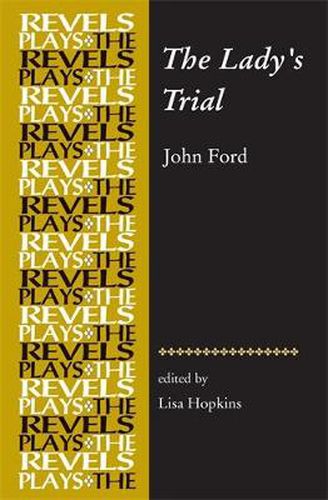Readings Newsletter
Become a Readings Member to make your shopping experience even easier.
Sign in or sign up for free!
You’re not far away from qualifying for FREE standard shipping within Australia
You’ve qualified for FREE standard shipping within Australia
The cart is loading…






John Ford is best known as the author of the controversial ‘Tis Pity She’s a Whore, but his other plays are also full of interest. The Lady’s Trial, his last play, both encapsulates the final development of his own unique theatrical aesthetic and also looks back to the drama of his youth, most notably Othello, whose story is here rewritten. In Ford’s version, the supposedly wronged husband, the victorious general Auria, does not simply take the word of his friend, the well-intentioned but overly suspicious Aurelio, that his wife, Spinella, is unfaithful: instead he does what Othello apparently never even thinks of doing, and conducrts a rational, public sifting of the apprent evidence, at the end of which Spinella is triumphantly cleared. In combining this story of public vindication with his distinctive dramatic style of delicate reticence, Ford offers a powerful exploration of both the capabilities and the limitations of language and its role in human relationships. This first scholarly edition of this undeservedly neglected play situates it in its dramatic and historical contexts and helps elucidate Ford’s understated, allusive style.
$9.00 standard shipping within Australia
FREE standard shipping within Australia for orders over $100.00
Express & International shipping calculated at checkout
John Ford is best known as the author of the controversial ‘Tis Pity She’s a Whore, but his other plays are also full of interest. The Lady’s Trial, his last play, both encapsulates the final development of his own unique theatrical aesthetic and also looks back to the drama of his youth, most notably Othello, whose story is here rewritten. In Ford’s version, the supposedly wronged husband, the victorious general Auria, does not simply take the word of his friend, the well-intentioned but overly suspicious Aurelio, that his wife, Spinella, is unfaithful: instead he does what Othello apparently never even thinks of doing, and conducrts a rational, public sifting of the apprent evidence, at the end of which Spinella is triumphantly cleared. In combining this story of public vindication with his distinctive dramatic style of delicate reticence, Ford offers a powerful exploration of both the capabilities and the limitations of language and its role in human relationships. This first scholarly edition of this undeservedly neglected play situates it in its dramatic and historical contexts and helps elucidate Ford’s understated, allusive style.